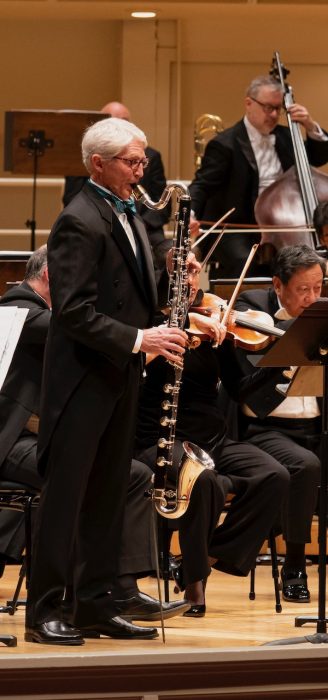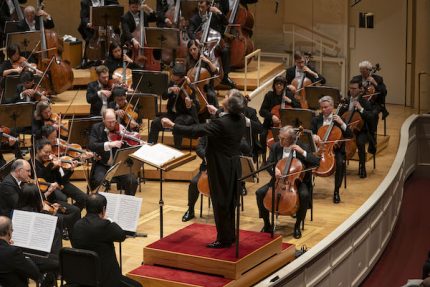With Bloom’s subtle artistry, a low instrument soars high in CSO premiere

It’s a fair bet that most of the people who packed Symphony Center on a frigid Thursday night were there to hear Riccardo Muti and the Chicago Symphony Orchestra tackle Beethoven’s mighty Symphony No. 5—as sure a piece of classical box-office bait as exists.
Yet the most intriguing experience came with the evening’s centerpiece, the world premiere of Nicolas Bacri’s Ophelia’s Tears—a bass clarinet concerto commissioned by the CSO and performed by J. Lawrie Bloom who is marking his 40th season with the orchestra.
Though it may resemble an unorthodox gardening tool, the bass clarinet has long been utilized for its subterranean tone and dark, often bleak qualities by such master orchestrators as Mahler, Ravel and Prokofiev down to John Adams and Esa-Pekka Salonen today. Less often is it heard as a concerto protagonist.
Ophelia’s Tears is adapted from a previous Bacri work, Ophelia’s Mad Scene for voice and (traditional) clarinet. Cast in a concise fifteen minutes and three interconnected sections, this “Concertane Elegy” is in essence a character portrait of the sensitive noblewoman of Shakespeare’s Hamlet, who is driven to insanity and suicide by the title prince’s rejection.
The subtitled sections (“Tragedy, “Madness” and “Death”) are manifest in the music, which is launched with a thunderous timpani outburst. The structure contrasts roiling symphonic turbulence against the soloist’s depiction of Ophelia. There are fugal string passages, moments of frenzied agitation, a squealing high piccolo, and malign, march-like episode—painting Ophelia’s psychological turmoil, as well as the callousness and grim violence of her external milieu.
Yet it falls primarily to the soloist to capture Ophelia’s melancholy and madness. Bloom, the CSO’s stalwart bass clarinet for four decades, did so with an opera singer’s flexibility and vocal expressiveness and a great actor’s resourcefulness.
This is not a flashy work for the soloist and even the cadenza is more interior than bravura in style. But Bacri’s concerto provided an ideal canvas for Bloom to show his subtle and refined artistry. It also served to demonstrate the varied range of expression that can be mined from what many would think an ungrateful solo instrument.
Playing with a natural, almost conversational ease, Bloom’s bass clarinet reflected Ophelia’s disordered mind with almost clinical precision, yet communicated in a plaintive tone that often felt improvisatory. The soloist brought warm, subtle eloquence to every phrase, often playing in the higher reaches of the instrument. Yet Bloom also found a striking degree of nuanced coloring in the subterranean passages.
Ophelia’s vulnerability and shifting emotions were rendered by Bloom with a sensitivity that was uncommonly affecting. In the slow final section an achingly beautiful theme arises in the strings, which is then taken up by the bass clarinet. The music slows down and the soloist’s notes descend into the depths as Ophelia seemingly finds the peace and solace in death that eluded her in life.
Ophelia’s Tears is an effective, compelling and masterfully written work. The clarinet is Bacri’s favorite solo instrument and he clearly knows how to exploit its capabilities in a resourceful and distinctive way. Though written for large forces, Bacri’s scoring is immensely skillful—never overwhelming his soloist and always serving the broader musical narrative.
Most of the more overt virtuosity is assigned to the orchestra and Muti led a powerful performance in this premiere that was acutely balanced yet blistering in intensity—not least David Herbert’s explosive timpani outbursts.
The ovations were instant, enthusiastic and genuine for Bloom, Muti, the orchestra and, especially, Bacri. The French composer was clearly touched by the vociferous cheers and extended applause, which continued for several minutes.
If any bass clarinet concerto has a chance at making it into the regular repertoire this is likely to be the one. Nicolas Bacri is highly prolific, having written several concertos, seven symphonies and ten string quartets. Let’s hope that the CSO and other local ensembles further explore the music of this gifted composer.

Muti’s Beethoven 250 cycle has been on hiatus for five months, after being launched last September with a surprisingly uneven first installment. Thursday night’s follow-up proved similarly mixed.
Beethoven’s Symphony No. 2, which led off the evening, was written at a dire time of the composer’s life when he learned that his encroaching deafness was incurable and would eventually become total (reflected in the despairing Heligenstadt Testament written to his brothers).
And yet the Second Symphony is one of Beethoven’s most joyous and life-affirming works, showing once again that the greater the artist, the greater the separation between their life and work. (Similarly, Tchaikovsky’s charming Nutcracker ballet was written not long before his bleak Pathetique” symphony.)
The Second Symphony, heard just last June, continues to be elusive for Muti. The CSO’s playing was as highly polished, scrupulously balanced and virtuosic as one expects from this partnership. Yet the genial essence of the music was too often left in the dust by Muti’s hard-driving approach.
The opening slow introduction was well-judged, taut and fraught with ominous tension. Yet the shift into the ensuing Allegro—while con brio to be sure as marked—dispelled little of the darkness, with Muti’s fierce style making the music emerge less sunny or charming than nerve-wracked and relentless. So too the humor of the finale was overwhelmed by the stern direction, Muti’s whipcrack sforzati burying the quirky dynamic flips with unwonted emphatic tension.
The performance was exciting on a superficial level but provided little contrast between the two Beethoven symphonies on the program, with the Second feeling like a somewhat less monumental version of the Fifth.
As is often the case with Muti’s Beethoven, the middle movements came off best with an easy, ingratiating flow to the Larghetto and aptly bumptious quality in the Scherzo, the woodwinds glorious and full of personality. What a wonderful addition principal oboist William Welter has been to the section and the entire orchestra.
There were no caveats to be had about the performance of the Fifth Symphony, which closed the evening. This was the 22nd time Muti has led this much-favored work with the CSO (both in town and on tour) and that experience showed with Thursday night’s performance one of the finest.
From the iconic four-note motif of the opening, there was a dramatic punch and a lived-in comfort with the score that made all the variegated elements register without special pleading or overdriving the tempos. The first movement’s drama and rhythmic insistence were tough and bracing yet contrasts underlined fluently, as with Welter’s freely expansive oboe solo. The Andante provided the requisite relaxed balm, yet with the more assertive sections nicely charted and a heart-easing leap up the scale in the lyrical theme near the coda
There was an uncommon freshness to this much-played score throughout. Cellos and basses really dug into the figures of the third movement and Muti drew a striking degree of piquant delicacy in the string pizzicatos.
Apart from the conductor characteristically keeping the brass on a very short leash, the final movement delivered a real sense of release and triumphant energy, beautifully played across all sections and built to a blazing, exhilarating coda.
The program will be repeated 8 p.m. Friday and Saturday and 3 p.m. Sunday. cso.org; 312-294-3000
Posted in Uncategorized





Posted Feb 23, 2020 at 1:47 am by Bob Scharba
From my terrace seat on Thursday night, I noticed the orchestra applauding Muti at his first curtain call following the 5th symphony. I don’t recall having seen this done before. They obviously felt a special gratitude for that night’s achievement.
Posted Feb 23, 2020 at 6:30 pm by CSO fan
Went to Friday’s performance which was attended by a packed house. After hearing many different recordings of Beethoven’s 5th (my favorite being Kleiber conducting the Vienna Philharmonic), I wondered how anyone could make it sound more interesting and enjoyable.
Maestro Muti’s interpretation and command of the orchestra really took the musicality of the piece to wondrous heights. Every section was on the ball at every moment. Each moment of music making was maximized. Really very awe-inspired by the magnificent CSO that night. Go see them if you have not already!
Posted Feb 24, 2020 at 1:45 pm by Roger McKinney
Although I did not attend Mr. Bloom’s performance of the Bacri, my sincere best wishes go out to him for a well deserved opportunity.
I am Lawrie’s clarinet teacher and he makes me proud of having known and taught a fine clarinetist and human being.
Roger W. McKinney
Professor Emeritus of Clarinet and Music History
The College of New Jersey